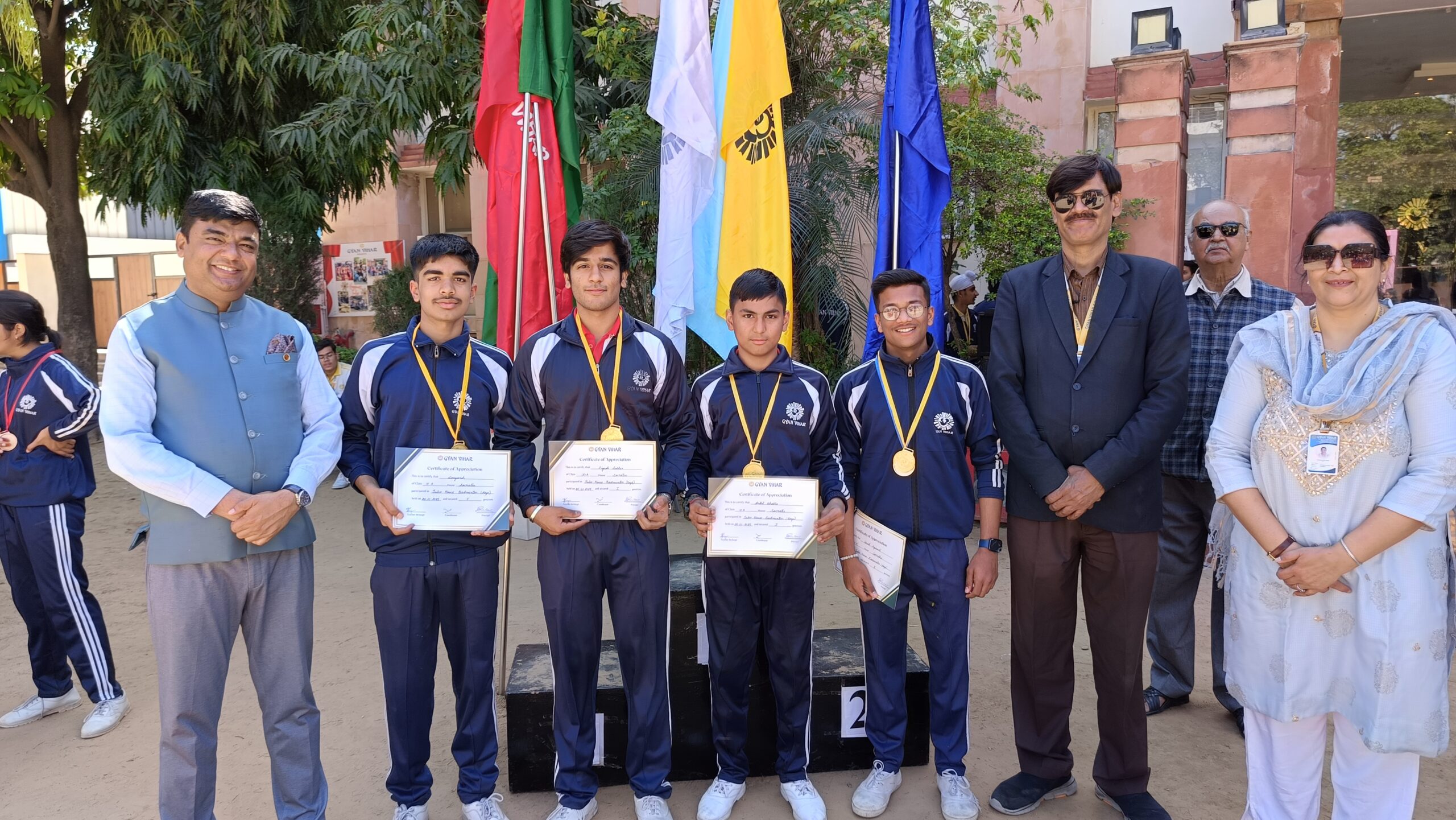In India, the land of rich cultural heritage and ancient traditions, the relationship between a student and their teacher holds immense significance. This sacred bond extends beyond the classroom, fostering a lifelong connection built on respect, knowledge, and gratitude. Here at Gyan Vihar World School, one of the Top CBSE Schools in Jaipur, we understand the importance of this philosophy. Today, we delve into Guru Dakshina, the tradition of giving back to your teacher.
Guru Dakshina: More Than Just a Gift
Translated as “teacher’s fee,” Guru Dakshina is not merely a monetary offering. It’s a multifaceted concept that embodies a student’s gratitude for the knowledge, guidance, and mentorship received from their teacher (Guru). It’s a way of acknowledging a teacher’s profound impact on shaping a student’s life.
The Historical Roots of Guru Dakshina
The tradition of Guru Dakshina finds its roots in ancient scriptures like the Vedas and Upanishads. These texts emphasize the importance of the Guru-Shishya Parampara (teacher-student lineage), where knowledge is passed down from generation to generation. The concept of Guru Dakshina ensured the teacher’s well-being and allowed them to dedicate their time and energy to imparting knowledge without financial constraints.
Beyond Material Offerings: Forms of Guru Dakshina
Guru Dakshina transcends material offerings. It’s a multifaceted concept that allows students to express their gratitude in various ways:
-
Shraddha and Bhakti (Devotion and Reverence):
The foundation of Guru Dakshina lies in a student’s unwavering devotion and respect for their teacher. This includes:
- Approaching the Teacher with Humility: A respectful demeanor and eagerness to learn set the tone for a positive learning experience.
- Active Listening: Paying close attention to the teacher’s instructions and explanations demonstrates respect and a desire to gain knowledge.
- Following Guidance: Putting the teacher’s teachings into practice showcases your trust in their knowledge and commitment to your learning.
-
Jnana (Knowledge):
A student’s ultimate goal is to acquire knowledge and utilize it for the betterment of oneself and society. Here’s how this translates to Guru Dakshina:
- Striving for Academic Excellence: Dedicating yourself to your studies and achieving good grades demonstrates your appreciation for the opportunity to learn from a knowledgeable teacher.
- Applying Knowledge in Real-World Situations: Using the knowledge gained in the classroom to solve problems, participate in projects, or contribute to discussions reflects a deep understanding and appreciation for the teacher’s guidance.
- Lifelong Learning: A true testament to Guru Dakshina is a commitment to continuous learning throughout your life. This shows that the teacher’s influence extends beyond the classroom walls.
-
Seva (Service):
Offering selfless service to your teacher is a way to express gratitude and lighten their load. This could include:
- Helping with Errands: Offering to run errands, fetch supplies, or assist with administrative tasks demonstrates your willingness to help.
- Assisting with Classroom Tasks: Volunteering to help with classroom setup, distribution of materials, or organizing learning activities showcases your support and appreciation.
- Offering Emotional Support: Sometimes, a kind word or a listening ear can go a long way. Being there for your teacher during challenging times demonstrates your respect and care.
-
Self-Discipline and Character Development:
Teachers play a vital role in shaping a student’s character. Here’s how your personal growth reflects Guru Dakshina:
- Developing Good Habits: Following a disciplined routine, completing assignments on time, and managing your time effectively are all habits instilled by good teachers. Demonstrating these qualities shows the positive impact of their guidance.
- Strong Moral Compass: Upholding ethical values, acting with integrity, and treating others with respect are testaments to the teacher’s influence on your character development.
- Taking Responsibility for Your Actions: Owning up to your mistakes, learning from them, and striving to do better reflects the positive values instilled by your teachers.
Guru Dakshina in Modern Times
The concept of Guru Dakshina remains relevant even in today’s modern world. While the societal structure has changed, the core values of respect, gratitude, and reciprocity in the teacher-student relationship continue to hold significance. Here’s how Gyan Vihar World School fosters the spirit of Guru Dakshina:
-
Creative Expressions of Gratitude:
Students can express their appreciation through creative mediums like writing poems, composing songs, or creating artwork dedicated to their teachers.
-
Technological Advancements:
Thank-you emails, online messages, or creating a digital presentation showcasing the teacher’s impact are ways to leverage technology for Guru Dakshina.
-
Peer-to-Peer Learning:
Senior students mentoring their juniors or organizing study sessions reflect the spirit of Guru Dakshina by sharing knowledge and offering guidance.
-
Community Service Projects:
Participating in community service projects with your teacher strengthens the bond and allows you to give back to society together, reflecting the values instilled by your teacher.
The Legacy of Gratitude: Benefits of Guru Dakshina
The practice of Guru Dakshina fosters a positive and enriching learning environment for both students and teachers:
-
Strengthens the Bond:
Expressing gratitude creates a stronger connection between the teacher and student. This mutual respect and understanding enhance the learning experience.
-
Motivates Students:
The act of giving back motivates students to excel in their studies, take ownership of their learning, and strive for further knowledge.
-
Appreciates the Teacher’s Effort:
It acknowledges the time, dedication, and effort teachers invest in their students’ development, fostering a sense of appreciation for their role.
-
Inculcates Values:
Guru Dakshina goes beyond academics. It instills valuable life lessons such as gratitude, respect, responsibility, and the importance of giving back.
-
Creates a Supportive Environment:
When students express appreciation for their teachers, it creates a more positive and supportive learning environment where everyone feels valued and respected.
-
Inspires Lifelong Learning:
The act of expressing gratitude for the knowledge received motivates students to continue learning throughout their lives. Recognizing the value of their teachers’ guidance encourages them to seek new knowledge and become lifelong learners.
Beyond Gyan Vihar World School: Guru Dakshina in Everyday Life
The spirit of Guru Dakshina extends beyond the walls of Gyan Vihar World School. It’s a concept that can be applied to various aspects of life:
-
Mentors and Role Models:
Expressing gratitude to mentors, coaches, or anyone who guides you on your life’s journey embodies the spirit of Guru Dakshina.
-
Appreciating Your Parents:
Your parents are your first teachers, guiding you through life with love and support. Recognizing their efforts is a form of Guru Dakshina.
-
Giving Back to Your Community:
The knowledge and skills you gain from your teachers empower you to contribute positively to your community. Volunteering your time, sharing your knowledge with others, or advocating for social causes are all ways to give back, reflecting the spirit of Guru Dakshina.
The Enduring Legacy: Embracing the Spirit of Guru Dakshina
The tradition of Guru Dakshina is more than just a custom; it’s a philosophy that emphasizes the importance of gratitude, respect, and the lifelong teacher-student bond. Here at Gyan Vihar World School, we strive to nurture this philosophy by creating an environment that fosters these values.
-
Gratitude Assemblies:
Regular assemblies encourage students to reflect on the positive influence of their teachers and express their appreciation through speeches, poems, or songs.
-
Teacher-Student Dialogues:
Open communication channels allow students to share their concerns and offer suggestions, fostering a collaborative and respectful learning environment.
-
Celebrating Teacher Achievements:
Recognizing teachers’ professional achievements, academic publications, or awards demonstrates appreciation for their ongoing dedication to learning.
A Lifelong Journey of Learning
The relationship between a teacher and student is a cornerstone of education. By embracing the spirit of Guru Dakshina, we acknowledge the profound impact teachers have on our lives. At Gyan Vihar World School, we believe that this gratitude is not just expressed in a single act but cultivated throughout a student’s academic journey.
Remember, a teacher is not just someone who imparts knowledge; they are a guide, a mentor, and a role model. Expressing your gratitude, big or small, goes a long way in strengthening this bond and creating a more fulfilling learning experience for both students and teachers.
Let the legacy of Guru Dakshina continue to inspire you!







